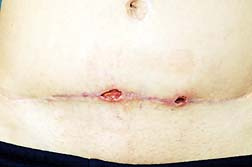 Recent research originating with the Bichat-Claude Bernard Hospital in Paris found that a significant percentage of patients released from the hospital were carrying MRSA away with them from the hospital into their homes. A total of 1,500 patients were tested immediately prior to being discharged. Patients were also tracked for the next year, in an effort to determine which patients cleared the organism vs. those who passed the MRSA infection on to others.
Recent research originating with the Bichat-Claude Bernard Hospital in Paris found that a significant percentage of patients released from the hospital were carrying MRSA away with them from the hospital into their homes. A total of 1,500 patients were tested immediately prior to being discharged. Patients were also tracked for the next year, in an effort to determine which patients cleared the organism vs. those who passed the MRSA infection on to others.Overall, according to the research findings, nearly 13 percent were carriers of MRSA when leaving the hospital setting. Half of those were cleared of the MRSA infection they brought home with them from hospital. However, among nearly 200 members of patients' households who were tested, nearly 20 percent were found to have acquired MRSA from the original patient, who passed the infection onto them.
Meanwhile, throughout the globe there are mixed results on the MRSA front. In the UK, Prime Minister Gordon Brown was lauding a drop of 36 percent in MRSA infections in the summer of 2008 over the same period a year before, while hospitals in North America were stepping up their efforts at hand-washing, one of the major transfer points of the MRSA infection.
READ MORE HOSPITAL INFECTION LEGAL NEWS
It has become a concern for schools. CBN tells the story of one young girl who developed an MRSA infection in her hip and wound up in hospital for a week, followed by an even longer convalescence at home. Doctors told CBN that an MRSA infection, which is really a staph infection, is relatively harmless simply sitting on the surface of the skin. It's only when it finds even the tiniest access point—either in a hospital setting or beyond—that it can be a threat.
In 2007 the Centers for Disease Control and Prevention (CDC) in Atlanta reported that more people in the US die from the mostly hospital-acquired MRSA staph infection, than from AIDS.
